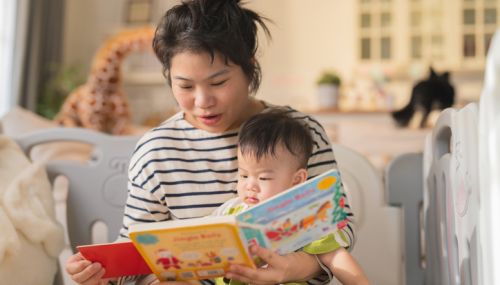Does parenthood impact mental health?
News
16 July 2025

While parenthood is linked with better mental health, new UCL research published today reveals social and economic circumstances also matter.
Mothers and fathers in their early 30s in England are slightly less likely to report symptoms of depression and anxiety and tend to be more satisfied with life than their peers who have not started a family.
However, significant mental health inequalities persist among both parents and people without children, with women, those without cohabiting partners, and people facing economic hardship at greater risk of psychological distress at age 32.
What the researchers looked at
Researchers from the UCL Centre for Longitudinal Studies analysed data from more than 7,000 millennials, born in 1989-90, who have taken part in the Next Steps study since adolescence. At age 32, study participants were asked about whether they had started a family, their fertility intentions, partnership status and employment situation. They also answered a series of questions to assess their mental health and wellbeing.
What the researchers found
Parents reported, on average, slightly fewer symptoms of depression and anxiety than those without children, but moderately better life satisfaction. While mothers tended to report higher levels of psychological distress than fathers, their levels of life satisfaction were about the same.
Interestingly though, the gap in life satisfaction between parents and non-parents was larger for males compared to females, indicating that parenthood may have a more positive impact on wellbeing than on mental health, especially for males.
Social and economic pressures
People living alone were at greater risk of poor mental health than those who were in a cohabiting couple, with the associated social and economic pressures felt particularly by parents.
Employment and financial stability were found to be key factors predicting better mental health. Millennial couples where both partner was unemployed tended to report higher levels of psychological distress than couples who were in work.
The study’s authors discovered that having children at a younger age was associated with a greater risk of poor mental health. The results revealed that for each year older a parent was when they had their first child, the better their mental health and wellbeing tended to be.
In addition, having a greater number of children was linked to worse mental health, particularly for mothers.
Fertility intentions
Among both men and women without children, those currently trying to have a child tended to be the most satisfied with life. Men who said they did not want children reported the lowest life satisfaction, whereas for women, it was those uncertain about their fertility intentions.
Just over half of millennials (54%) in the study were parents at age 32. The average age when they had their first child was 28. Women and people from more disadvantaged backgrounds were more likely to be parents by their early 30s.
Co-author, Dr Morag Henderson (UCL Centre for Longitudinal Studies) said: “Our findings point to the need to better support the mental health of both parents and people without children by addressing gender differences in the workplace, and financial instability. For parents in particular, a greater focus on parental mental health and workplace provisions such as flexible working and parental leave could improve their situation. However, the inequalities highlighted in this study inform the need for tailored mental health support for different parental experiences, such as younger parents, parents who are not in a cohabiting relationship and for larger families.”
Media coverage of this research
The Times (£) – Parents happier than childless couples, but not if they start young
The Times (£) – The terrifying, awesome experience of becoming a young parent
BBC World Service – The Newsroom
BBC Radio Five Live Breakfast
Further information
Parenthood and mental health: initial findings from Next Steps at age 32, by Rosie Mansfield and Morag Henderson is available on the CLS website.
Back to news listing





